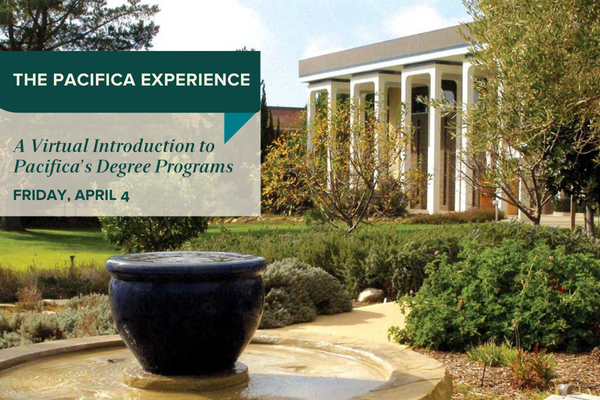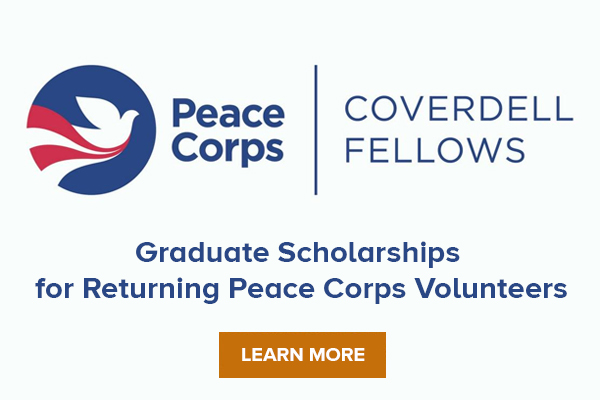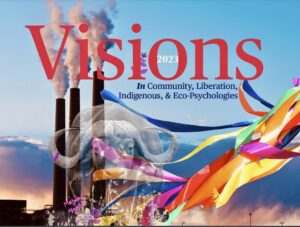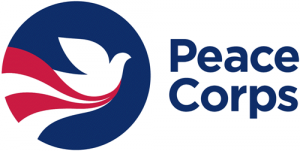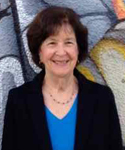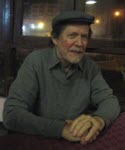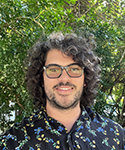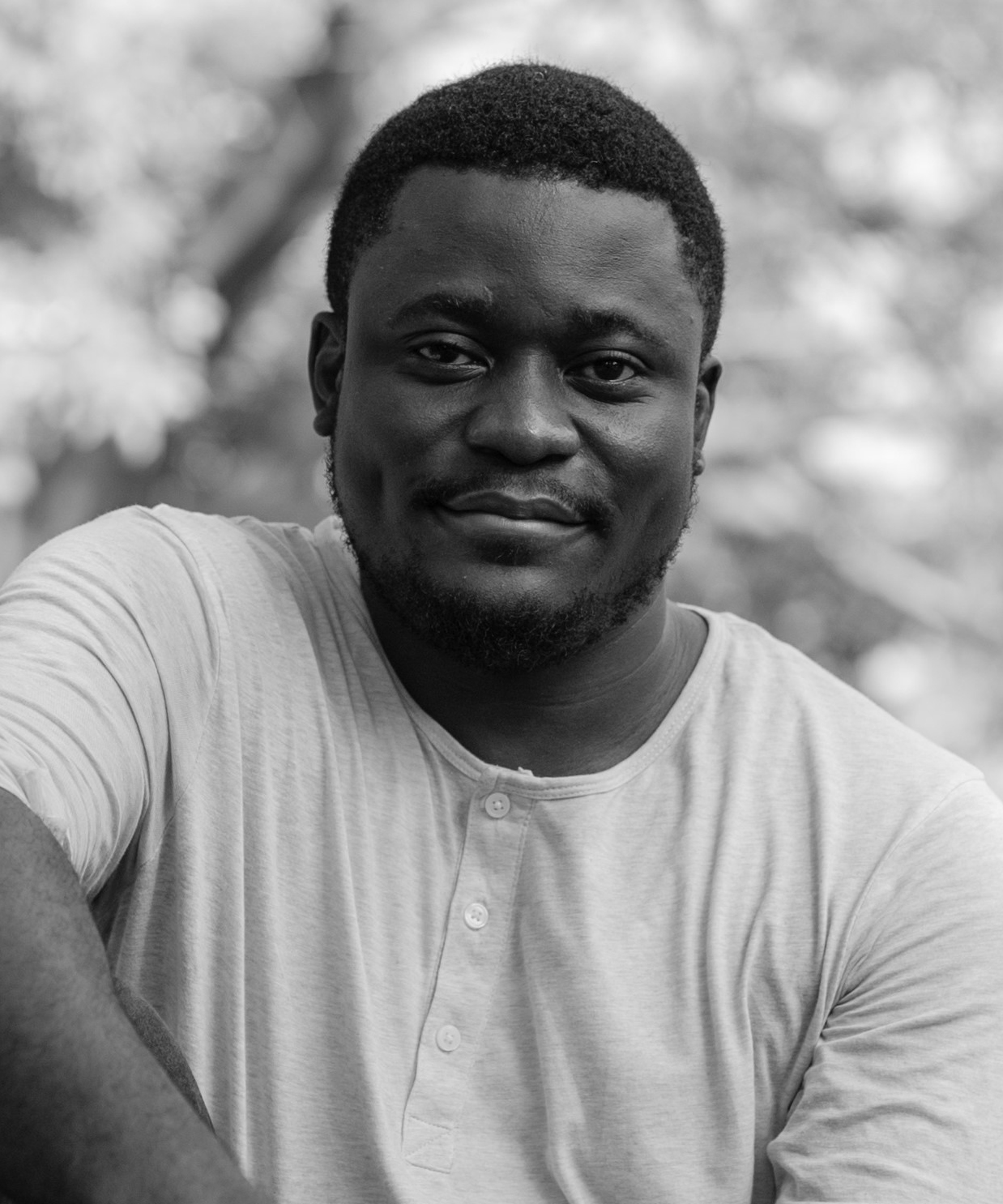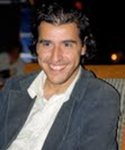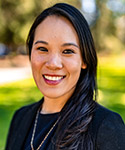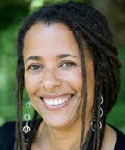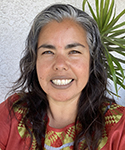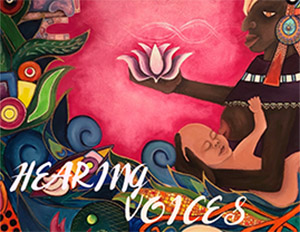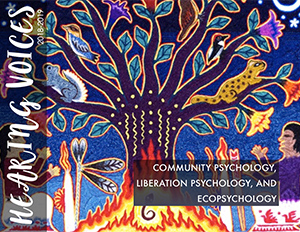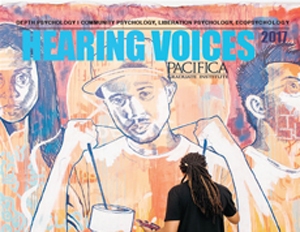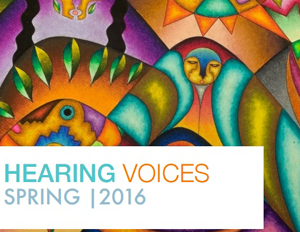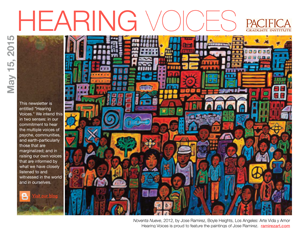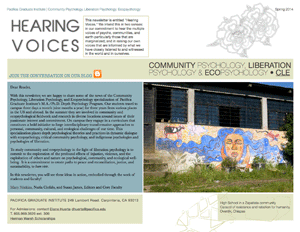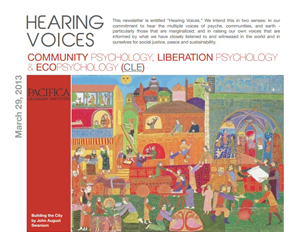Community, Liberation, Indigenous, and Eco-Psychologies
Now Accepting Applications for Fall 2025
To study community and ecopsychology in the light of liberation and indigenous psychologies commits us to deeply explore and address the profound effects of injustice, violence, and exploitation on psychological, communal, and ecological well-being.
Request More InformationM.A./Ph.D. Program in Depth Psychology with Specialization in Community, Liberation, Indigenous, and Eco-Psychologies
About
State Authorization: Click to View States Pacifica is Authorized to Enroll By Program.
This degree program specialization is a bold initiative to forge transdisciplinary and transformative approaches to the critical personal, community, cultural, and ecological challenges of our time. Accomplishing this necessitates a radical engagement in re-conceiving psychology as a potentially liberatory and restorative force in society, one engaged in initiatives to promote social, economic, and environmental justice, peace-building, and ecological sustainability. The specialization is committed to rebuilding fragmented cultural and ecological connections, and to co-creating democratic, dialogical, joyful, sustainable, and nonviolent living.
The curriculum places multicultural approaches to depth psychological theories and practices in dynamic dialogue with ecopsychology, indigenous psychologies, critical community psychology, and psychologies of liberation from diverse cultural settings. Students gain an understanding of the interdependence of individual, community, cultural, and ecological well-being.
Coursework nurtures creative approaches to collaboration in organizations, non-profits, community groups, and educational settings. Through community and ecological fieldwork and research, students are supported in the pursuit of their distinctive areas of interest, and in strengthening their research and practice skills so that they are able to make their own significant contributions.
Program Schedule
This program meets once a month on campus on Mondays, Tuesdays, and Wednesdays during the Fall, Winter, and Spring terms. Monday and Tuesday classes are from 9:00 am-5:40 pm and Wednesdays from 8:15 am-4:00 pm with evening sessions dependent on the term. Summer Terms include community praxis or dissertation depending on the year.
Students in the Community, Liberation, Indigenous, and Eco-Psychologies specialization:
- Deepen insight about individual, group, and cultural life through study of depth psychology
- Develop scholarly and creative writing skills
- Learn innovative and historical approaches to trauma healing, restorative justice, ecological sustainability, community building, economic justice, forced migration, alternatives to violence, peace-building, and reconciliation
- Practice participatory action research and program and organizational evaluation, while deepening ethical discernment of issues of power and privilege
- Train in a wide variety of group approaches to cultural and ecological work
- Heighten sensitivity to the imaginal, the metaphorical, and the mythical
- Develop the capacity to teach in academic and community learning environments
- Apply insights to leadership positions in a wide variety of professions, including: health services; youth, secondary, adult, and alternative education; organizational development and transformation; prison reform and restorative justice initiatives; non-profits and non-governmental organizations; social justice, advocacy and grassroots coalitions; arts-based community building; trauma healing; and environmental sustainability and justice.
Contact the Admissions Advisor
- Michael Mirabella, Admissions Advisor
- Phone (call or text): 805-881-1311
- Email Address: mmirabella@pacifica.edu
“…I hope at least that the following will endure: my trust in the people, and my faith in men and women, and in the creation of a world in which it will be easier to love.”
Career Pathways
Students and alumni work in fields such as education (high schools, colleges, universities, prisons, alternative learning centers, youth programs); prison reform and restorative justice initiatives; arts-based community building; trauma healing; advocacy and grassroots coalitions; social justice; organizational development and transformation; peacebuilding and community dialogue; health services (including hospice); NGO’s (nongovernmental organizations); planning and evaluation; land preservation, peak oil planning and sustainability issues, local food initiatives; philanthropy; microlending and economic alternatives.Featured Blog Posts and Multi-Media
Scholarships
CLIE Tuition Matching Grant Offered to newly admitted students entering the M.A./Ph.D. Depth Psychology with Specialization in Community Psychology, Liberation Psychology, Indigenous, and Ecopsychology program.
Education Assistance The Education Assistance Scholarship is sponsored by Pacifica Graduate Institute and offered to new and returning students based on extreme financial hardship and strong academic excellence.Yellow Ribbon Matching Scholarship Pacifica Graduate Institute is pleased to announce that we have entered into an agreement with the Veteran’s Administration in support of veterans continuing their education under the Post 9/11 GI Bill.
Herman Warsh Scholarship Offered to newly admitted students entering the M.A/Ph.D. Depth Psychology with Specialization in Community Psychology, Liberation Psychology, and Ecopsychology program.
Segal AmeriCorps Matching Scholarship Offered to new and returning students. Pacifica Graduate Institute is a proud participant in the Segal AmeriCorps Matching Education Award program and is pleased to offer the Segal AmeriCorps Matching Scholarship to qualified AmeriCorps Alumni enrolled in one of our MA or PhD programs.
For more information visit Pacifica Scholarship Programs.
Co-Chairs & Faculty
Our faculty are acclaimed scholars, distinguished writers, and dedicated researchers in the fields of critical Community, Liberation, Indigenous, and Eco-Psychologies, depth psychology, and philosophy. In tandem with their scholarship, they are community psychology practitioners, scholar- activists, and ecopsychological and cultural workers.
Request Information
Learn MoreSpecialization FAQs
Do I need to move to Santa Barbara to attend this specialization?
Most of our students do not live in Santa Barbara. They travel from a wide variety of states and countries to attend nine 3-day sessions (October-July) each year. Pacifica has this unusual design to allow people to carry on their work, community, and family commitments in their home locations.
What types of financial assistance are available to students in the Community, Liberation, Indigenous, and Eco-Psychologies Specialization and who do I contact for this information?
Pacifica is approved by the U.S. Department of Education for participation in the Direct Stafford and Graduate Plus Loan Programs. Qualified students for the Stafford Loan may borrow up to $20,500 per year and in the Grad-Plus Loan up to the Cost of Attendance minus other financial aid. Repayment on both loans may be deferred while enrolled at least half-time (3 units). Both the Stafford Loan and the Plus Loan programs offer a six-month post-enrollment grace period before repayment begins.
For more detailed information about the financial assistance opportunities available, including the scholarships below, feel free to contact the Financial Aid Office at ext. 197 or by e-mail at financial_aid@pacifica.edu.
Are there scholarships available?
How do I apply for financial aid?
All students who wish to apply for the federal Direct Loan Programs are required by the Department of Education to complete the Free Application for Federal Student Aid (FAFSA) form each year of enrollment. The FAFSA form is available on the web at www.fafsa.ed.gov. Students need to include Pacifica’s school code (G31268) to ensure the results are forwarded to the school.
May one enroll for the purpose of earning only an M.A. degree or a Ph.D.? Is it possible to do an abbreviated program if one already has an M.A. degree prior to enrolling at Pacifica?
The M.A./Ph.D. program is a doctoral program which awards the M.A. after the successful completion of 50 quarter units, 60 hours of depth transformative practice, and a comprehensive written exam. All courses are doctoral level. A student may choose not to continue with a third year of study and be eligible to receive the M.A. degree. Students are eligible to apply for up to 16 units of transfer credit before they begin the program (see below).
Does a student need to have a B.A. in psychology to apply? What kind of job background do incoming students have?
Students with a variety of educational backgrounds are accepted to the program. A B.A. is required, and a previous background or readings in the fields of anthropology, psychology, cultural studies, environmental science and design, environmental justice, political science, and sociology, provide particularly appropriate preparation for our interdisciplinary program. Our new students over the years work in a wide variety of endeavors: community organizers, nonprofit agency professionals, healthcare professionals, educators, environmental educators, artists, youth workers, cultural workers, architects, animal rights activism, land conservationists, justice system reformers, and many others.
What does a doctoral degree in this specialization prepare one for in terms of career opportunities?
Work in nonprofits, foundations, community groups, environmental initiatives; formal and informal education (high schools, community colleges, liberal arts colleges, universities, retreat centers, prisons, alternative learning centers, youth programs, medical and nursing education, workshop leaders, adult education, organizational training); writing and publication; diversity training; prison reform and restorative justice initiatives; arts-based community building; trauma healing; advocacy and grassroots coalitions; social justice; documentary filmmaking; organizational development, evaluation, and consulting; peacebuilding and community dialogue; health services (including hospice); spiritual direction; NGO’s (nongovernmental organizations); planning, visioning, and evaluation; urban planning; land preservation; peak oil planning and sustainability issues; local food initiatives, community gardens, permaculture; intentional communities; philanthropy; microlending and economic alternatives. We welcome other areas that would be served by studying depth psychology with an emphasis in Community, Liberation, Indigenous, and Eco-Psychologies!
What qualities are looked for in considering an applicant for admission to Community, Liberation, Indigenous, and Eco-Psychologies Specialization?
The Admissions Committee looks at the applicant’s potential for meaningful graduate level work, past educational experience, oral and written skills, creative goals and abilities, and personal readiness. We value previous life experience in and commitment to community and environmental issues. Our specialization requires learners who are self-motivated as independent scholars and critical thinkers with an imagination for the possible.
May an applicant who has been accepted to the program defer enrollment?
Yes, an applicant may defer enrollment for one year.
How long is the program?
Students attend classes for three years. Each year classes are held for nine 3-day sessions (Monday, Tuesday and Wednesday) on campus, and community and ecological fieldwork is conducted in a location that makes sense for an individual student’s area of interest. Classes are held mornings, afternoons, and some Monday and Tuesday evenings. As indicated above, the M.A. is awarded after two full years of coursework, while the Ph.D. is granted after three years of coursework and the successful defense of a dissertation. Dissertation work is ordinarily accomplished in the 4th and 5th years and does not require on campus presence, except for the oral defense.
What is the general format of classes?
Most courses are a combination of lecture, discussion formats, and experiential activities. Some include a partial seminar format in which students make short presentations on topics they are researching for the course. Students can expect to encounter a variety of pedagogical styles during the course of their enrollment in the program.
How much work is required outside of class?
Class assignments consist of readings, papers, and/or projects. As a general rule, for every hour in class there is approximately three hours of work outside of class. However, the amount of time a given student invests in his or her coursework can vary a good deal and depends upon a variety of factors such as learning style and study habits. Students are advised to select topics for term papers early in the course. Doing so helps students be more focused and organized in their reading. Most course papers can be specialized to help students develop knowledge in an area of the course that is related to their particular set of interests.
When do students have an opportunity to meet with faculty?
The faculty hold office hours during every campus session. These hours are announced on posted sign-up sheets for appointments are posted. In addition, instructors can be contacted by email if you would like to set up an additional appointment.
Can course work from other institutions be transferred to Pacifica for credit?
A maximum of sixteen (16) units of external transfer credit can be accepted. Enrolled students who wish to have previous coursework evaluated may petition the program chair to have relevant (graduate level) course work reviewed following acceptance to the program through the Admissions Office. A syllabus is required for the course completed at another institution. There needs to be approximately 75% overlap with the Pacifica course for transfer credit to be granted. Requests for transfer credit must be submitted before classes begin in the first year.
If a student must miss a session, how is this handled?
The Student Handbook states that students may not miss more than five (5) class days per academic year, and must attend a minimum of 2/3 of the total classroom hours for each course. Beyond this amount, the student must petition the Education Council for an exemption to this policy.
May a student leave early on Wednesday?
Classes are over at 4:00 pm on Wednesday. Given the importance of class time, instructors expect students to be in attendance for the duration of each class.
Can a student invite friends or family to the school during their session of classes?
The school provides accommodations and meals for students only. However, for the occasional visit by a family member or friend, meals are available when previously arranged with the Guest Services Coordinator, Nicole Kitzmann, by e-mail at nkitzmann@pacifica.edu. In order to maintain classroom cohesiveness, we regret that we are unable to invite guests to our classes.
What does it mean to be a residential student?
Students who attend Pacifica and who do not reside in Santa Barbara or Ventura County are provided with room and board during their educational sessions. We feel that this arrangement provides the best context for building community and encouraging dialogue among students and faculty.
What types of accommodations are available for residential students?
Accommodations for students enrolled at the Ladera Lane campus are provided by Pacifica in the Residence Hall. The Residence Hall is a dormitory style building providing single occupancy. In addition, students can drive directly to the Ladera campus, as student parking is provided.
Can a student cancel their reservation?
Any requests for cancellation should be submitted in writing to the Housing and Guest Services Coordinator at least five (5) days prior to arrival.
Can a student arrive early or stay later than their scheduled session in order to accommodate travel arrangements?
Yes, early arrivals and late stay reservations can be arranged through the Housing and Guest Services Coordinator for one extra night before and one extra night after your session. Additional nights may be made if communicated in a timely manner.
How does Pacifica handle special dietary needs?
Students with special dietary needs submit a request form outlining their needs. If the request is approved, the student speaks with the Housing and Guest Services Coordinator prior to the beginning of the year to discuss how their needs might best be accommodated. Pacifica honors vegetarian, vegan, and medically restricted diets.
Students requesting a medically restricted diet are asked to include with their dietary form a prescription or letter from a doctor outlining their dietary requirements or restrictions. These letters are used by the kitchen staff as guidelines for customized menu preparation.
Is a car necessary? How does one get to campus from either the L.A. or Santa Barbara airports?
It is unnecessary to have a car. Students arriving at Los Angeles International Airport can utilize the Santa Barbara AirBus Service. Santa Barbara AirBus makes a station stop at the IHOP restaurant in Carpinteria. Students may ask the driver to drop them off at the Best Western, but this is not always possible. One would have to taxi from the IHOP to the Best Western. From the Best Western, Pacifica provides transportation directly to either campus, as noted above. Students arriving at the Santa Barbara Airport can utilize a taxi service, which will deliver students directly from the Santa Barbara Airport to either campus.
Curriculum Overview
Classes for the Community, Liberation, Indigenous, and Eco-Psychologies specialization take place in nine three-day sessions (Monday, Tuesday, Wednesday), approximately once each month during fall, winter, and spring. In the first and second summers, students complete fieldwork and research in their home communities or other off-campus sites. In the third summer and subsequent year(s), students are involved in writing their dissertations in their home communities. Also, see the Suggested Reading List for this specialization.
First Year
Second Year
Third Year
- Critical Topics in Depth Psychology - DPC 963, 2 units
- Critical Topics in Liberation Psychology - DPC 964, 1 unit
- Liberatory Pedagogy - DPC 992, 2 units
- Critical Topics in Environmental Justice - DPC 832, 1 unit
- Dissertation Development II - DPC 932B, 2/3 units
- Critical Topics in Indigenous Psychologies - DPC 861, 1 unit
Continuing
Requirements For Graduation
Degree Requirements for Graduation
- Students must complete a total of 90 quarter units for the Ph.D. to fulfill the degree requirements for graduation. A minimum grade of C is required in each completed course. A cumulative grade point average of 3.0 must be maintained.
- Students must attend at least 2/3 of each course.
- During the second year of coursework, students must pass a written comprehensive examination. The M.A. degree is awarded when the exam is passed and 50 units of first and second year coursework and community praxis, and 60 hours of depth transformative practices are completed.
- Students must petition to proceed with the third year. Faculty approval is based on a comprehensive review of coursework, exam results, writing skills, and readiness to conduct research.
- Students must pass an oral examination at the end of the third year of coursework.
- Students must submit and defend an original dissertation accepted by the faculty.
Comprehensive Examinations
The comprehensive examinations consist of a written portion at the end of the second year, and an oral portion at the end of the third. The written examination is designed to assess knowledge gained in the first two years, and is a requirement for the awarding of the M.A. degree. The third year oral examination consists of the student’s formal oral presentation addressing the ways the three years of study have informed and seeded their work leading to the dissertation.
Doctoral Dissertation
The dissertation process involves the completion of Dissertation Development and Dissertation Writing courses. Students must have completed all requirements for the M.A. degree and have an approved concept paper before enrolling in Dissertation Writing. The Dissertation Committee is comprised of a Chair, an Internal Reader, and an External Reader. Each member of the committee must possess an earned doctorate based in part on a dissertation unless this requirement is waived by the Program Chair due to their professional expertise in the area of the dissertation research.
Other Requirements: Community and Praxis and Research (DPC 783, 883)
Students are required to arrange for Community Praxis fieldwork in their home communities or other settings during the first and second summers. A minimum of 70 hours of direct participation in a setting, and 140 hours of related reading, writing, and reflection are required in the first summer. This is also true in the second summer, unless a student chooses to engage in Community Praxis research, in which case hours of direct participation may be less to allow for in depth data analysis.
NOTE: The Depth Psychology Program and its specializations are designed to provide students with knowledge of theoretical traditions of depth psychology and its contemporary applications to personal, cultural, community, and ecological health and well-being. The program does not prepare students to become licensed or to practice psychotherapy. Although some students may wish to pursue licensure after gaining their doctorate in this program, the curriculum does not contain specific coursework aimed at any type of licensure, nor does it arrange or administratively support traineeships, pre- or post-doctoral internships, or other practice requirements related to licensure.
Enroll Today
Apply NowNews & Media
Mirian Vilela, the Executive Director of the Earth Charter International in Costa Rica, discusses “The Earth Charter and the Search for Humanity’s Shared Values.” Part of the International Lecture Series at Pacifica Graduate Institute.
Peter Westoby, a Senior Lecturer in Community Development at Queensland University, Australia and a Research Fellow with the Centre for Development Support, University of Free State, South Africa has been studying depth and archetypal psychology and integrating them into his dialogical and narrative approach to community work. Dr. Westoby was a recent visiting scholar in the Community, Liberation, Indigenous, and Eco-Psychologies Specialization.
We welcomed visiting scholar G. Karthikeyan (Karthik) from Pondicherry, India to the Ecodreamers group of the Community Psychology, Liberation Psychology, and Ecopsychology Specialization. Dr. Karthikeyan recently founded Sristi Village—”an ecological community whose mission is to provide those of all abilities with a community connected to the earth and one another, modeling dignity and respect for all beings.”
All of Pacifica Graduate lnstitute’s degree programs are accredited by the Western Association of School and Colleges (WASC) and federal financial aid is available for those who qualify.

